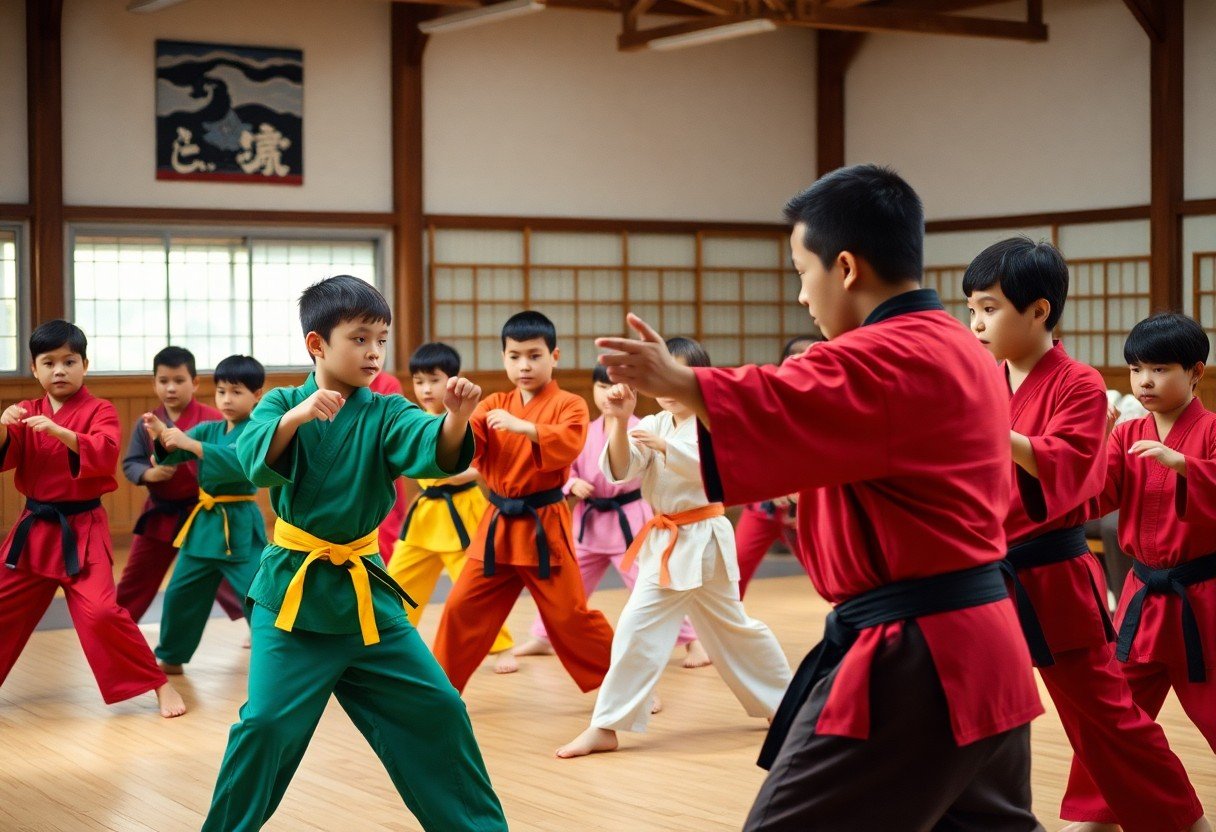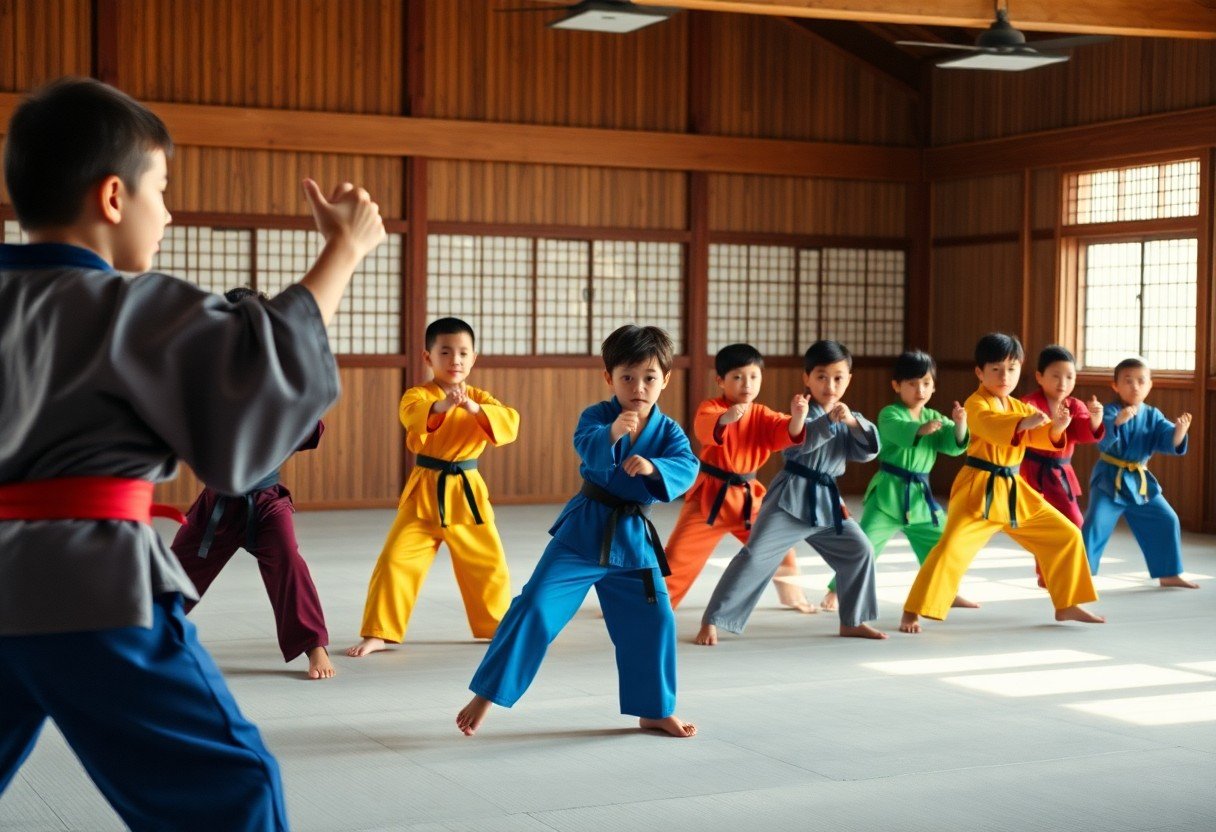Health is paramount, especially for children, and engaging in martial arts can be a transformative experience for your child. Not only does it improve their physical fitness through enhanced strength, flexibility, and coordination, but it also fosters vital mental resilience and discipline. Through practice, your child can develop important life skills such as self-confidence and focus, while also learning to manage stress and emotions. By introducing them to martial arts, you are equipping them with tools for both physical and emotional well-being, setting the foundation for a healthier future.
Physical Health Benefits
To explore the myriad of physical health benefits martial arts offer, consider how it actively engages children, promoting overall fitness and well-being. From improving cardiovascular health to increasing muscle tone, martial arts provide a comprehensive workout that sets the foundation for a healthy lifestyle. Your child’s participation in these activities not only strengthens their body but also instils discipline and commitment to fitness, paving the way for lifelong health habits.
Improved Strength and Conditioning
On participating in martial arts, your child will experience a significant increase in overall strength and conditioning. The varied techniques involved target multiple muscle groups, fostering both functional and explosive strength. This enhanced physical capability not only boosts performance in martial arts but also translates into improved abilities in other sports and daily activities.
Enhanced Coordination and Balance
Benefits of martial arts practice extend to better coordination and balance. As your child progresses through different forms and techniques, they will develop strong body awareness, which is necessary for executing movements effectively. This heightened sense of control contributes to agility and stability both on and off the mat.
Conditioning your body through martial arts leads to an impressive improvement in your child’s coordination and balance. They will learn to synchronise their movements, enhancing their ability to respond quickly and accurately in various situations. This increased agility is especially beneficial for sports performance and everyday activities, reducing the risk of falls and injuries.
Fostering Healthy Lifestyle Habits
Before engaging in martial arts, understanding the importance of healthy lifestyle habits is vital for your child’s growth. In addition to the physical challenges, martial arts encourage your child to adopt beneficial eating patterns, routine physical activity, and adequate rest. Cultivating these habits early on can create lasting positive change.
Enhanced healthy lifestyle habits through martial arts will enable your child to make informed choices about nutrition and exercise. This holistic approach not only benefits their physical health but also contributes to better mental well-being and improved self-esteem. By instilling these habits, you are setting the stage for your child to lead a balanced and fulfilling life.
Mental Health Benefits
Any parent seeking to enhance their child’s wellbeing can benefit from understanding the psychological advantages of martial arts participation. Research highlights the effects of martial arts participation on mental and emotional health, showing marked improvements in areas such as self-esteem, stress management, and emotional regulation, making it an exceptional choice for young individuals.
Boosting Self-Esteem and Confidence
To thrive in martial arts, your child must overcome challenges, leading to a significant boost in self-esteem and confidence. Each challenge conquered, whether mastering a new technique or earning a belt, reinforces a sense of accomplishment and reinforces their belief in their abilities.
Stress Relief and Emotional Regulation
Along with physical conditioning, martial arts provides an effective outlet for your child’s stress and frustration. The structured environment and focus on breathing techniques during training can significantly enhance their ability to regulate emotions, promoting a more balanced and calm mindset.
Indeed, martial arts encourages you to release pent-up energy and stress through rigorous physical activity, creating a natural form of stress relief. The combination of intense focus required during practice and the meditative aspects of certain disciplines allows for greater emotional resilience. As your child learns to navigate their emotions, they become equipped to handle life’s challenges more effectively, reducing anxiety and fostering a positive outlook.
Discipline and Focus Development
Across various martial arts disciplines, your child will learn the importance of discipline and concentration. Training requires consistent effort and attention to detail, helping to cultivate a focused mindset that translates into other areas of their life.
Even beyond the dojo, the discipline instilled through martial arts practice can have a profound impact on your child’s daily routines. As they learn the value of setting goals and working diligently towards them, this newfound focus can improve their academic performance and enhance their ability to manage time effectively. The regular practice also instils a sense of responsibility and commitment, which are beneficial traits as they grow.
Social Benefits of Martial Arts
Once again, the social benefits of martial arts play a significant role in your child’s development. Participating in martial arts fosters a sense of belonging and companionship that can aid in building social skills. Through shared experiences and challenges, children can create strong bonds with peers while learning vital life skills. For more insights into the 9 benefits of martial arts for kids who learn and think differently, explore how these classes can enrich your child’s social landscape.
Building Friendships and Community
An environment that martial arts provides encourages friendships and community from the very start. As your child trains together with their classmates, they build relationships that often extend beyond the dojo, promoting a sense of camaraderie that is vital for their emotional growth.
Respect and Teamwork Skills
Above all, martial arts instils respect and teamwork skills in your child. They learn to value their instructor and peers, understanding that mutual respect is vital for a supportive training environment. This foundation enhances not only their martial arts experience but also their interactions outside the dojo.
Teamwork in martial arts teaches you the importance of collaboration and trust. As your child practices with partners, they learn to rely on each other for support and safety during drills and sparring. This experience champions the development of effective communication skills and fosters a deep sense of cooperation. By cultivating respect for their peers, they also grasp the significance of fair play and sportsmanship, traits that will benefit them throughout their lives.
Overcoming Challenges through Martial Arts
Keep in mind that martial arts training presents numerous challenges that encourage personal growth. As your child learns to face obstacles, they develop skills that positively influence their daily lives. Whether through sparring, forms, or grappling, each encounter requires mental and physical fortitude, teaching young practitioners how to confront their fears and view challenges as opportunities for improvement.
Resilience and Perseverance
An important aspect of martial arts is fostering resilience and perseverance in your child. They will learn that setbacks, whether in training or competition, are part of the process. Each failure becomes a stepping stone toward mastery, instilling a belief that dedication and hard work lead to success.
Goal Setting and Achievement
On another note, martial arts provide a unique platform for honing goal-setting and achievement skills. Practitioners are encouraged to set objectives, such as earning a new belt or mastering a particular technique, which motivates them to work diligently and stay focused.
Indeed, setting and achieving goals in martial arts not only enhances your child’s self-esteem but also builds their capacity for long-term commitment. As they progress through different belt ranks, they experience the satisfaction of accomplishment, reinforcing the understanding that hard work and determination yield tangible results. This principle of setting achievable goals can be translated into other areas of life, promoting a balanced approach to achieving success in academics, friendships, and beyond.

Choosing the Right Martial Arts Program
All parents want the best for their children, and selecting the right martial arts programme can significantly influence their physical and emotional development. It’s vital to consider factors such as the style of martial arts, the training environment, and the ethos of the school. Look for a programme that aligns with your child’s interests and encourages positive learning experiences while promoting self-discipline and respect.
Considerations for Age and Skill Level
Before you choose a programme, assess your child’s age and skill level. Different martial arts disciplines offer various benefits tailored to children at different stages of development. Ensure that the programme provides appropriate classes that cater to beginners, allowing them to grow and build confidence at a comfortable pace.
Finding Qualified Instructors
The suitability of your child’s martial arts journey hinges on the quality of the instructor. A qualified instructor should have the necessary credentials, experience, and an empathetic approach to teaching children. Engaging with a professional who creates a safe and supportive environment is vital for your child’s success and enjoyment.
With the right instructor, your child will thrive in martial arts. Look for certified professionals who have demonstrated a profound understanding of safety protocols and possess the skills to teach effectively. An instructor who prioritises positive reinforcement and strives to cultivate a supportive atmosphere can make a lasting impact on your child’s learning experience, ultimately enhancing their journey in martial arts.
Parental Involvement and Support
After enrolling your child in martial arts, your active involvement can significantly enhance their experience. Showing up to classes, encouraging practice at home, and participating in events fosters a stronger bond between you and your child. This support not only boosts their confidence but also encourages perseverance through the challenges they may face along the way. Your enthusiasm can help cultivate a lifelong love for martial arts while instilling discipline and respect.
Encouraging Participation
At every stage of your child’s martial arts journey, it’s crucial to encourage their participation in classes and competitions. Make it a priority by setting achievable goals together, celebrating their progress, and fostering a positive environment where they feel comfortable trying new techniques. Your commitment can inspire them to stay motivated and engaged.
Understanding the Martial Arts Journey
Among the many facets of martial arts, it’s important for you to comprehend the challenges and milestones that define this journey. As your child progresses, they’ll encounter various levels of skill development, emotional growth, and even minor setbacks. Understanding this journey helps you provide the right level of support while encouraging resilience and adaptability.
To fully grasp the martial arts journey, you should focus on the variety of experiences and emotions your child will encounter. As they learn techniques, they will also face frustration and self-doubt, which are normal parts of the learning curve. Acknowledge their efforts and celebrate every accomplishment, as these moments will contribute to their confidence and growth. By reassuring them that perseverance leads to progress, you can foster a positive mindset and help them understand that mastery takes time, effort, and commitment.
Conclusion
With this in mind, martial arts provide remarkable physical and mental health benefits for your child. Engaging in these activities not only fosters physical fitness, enhancing strength, coordination, and flexibility, but also promotes mental resilience, discipline, and self-confidence. As your child learns to navigate challenges on and off the mat, they develop vital life skills that contribute to their overall well-being. By introducing them to martial arts, you are not just encouraging a hobby; you are investing in a healthier, more balanced future for your child.
FAQ
Q: What are the physical health benefits of martial arts for kids?
A: Martial arts provide a range of physical health benefits for children, including improved cardiovascular fitness, strength, balance, and flexibility. Engaging in regular practice enhances muscle tone and endurance, which can contribute to a healthier lifestyle overall. Additionally, martial arts involve varied movements that promote coordination and agility, allowing children to develop their motor skills effectively.
Q: How does martial arts contribute to mental health and well-being in children?
A: Martial arts significantly contribute to the mental health of children by fostering discipline, focus, and self-control. The structured environment of martial arts training teaches kids to set goals and work towards achieving them, which can boost their self-esteem and confidence. Moreover, the practice encourages mindfulness and stress relief, providing an effective outlet for managing anxiety and frustration.
Q: Can martial arts help improve social skills in children?
A: Yes, martial arts can enhance social skills in children by teaching them the importance of teamwork, respect, and communication. Training often involves partner drills and group activities, allowing kids to interact positively with their peers. This social engagement helps children build friendships and develop empathy, which are vital components of emotional intelligence.
Q: What age is appropriate for children to start martial arts training?
A: Many martial arts schools offer classes for children as young as three or four years old, focusing on basic skills and fun activities. Generally, children can start training effectively around the age of six when they are better able to follow instructions and participate in structured activities. It is important for parents to choose a class suitable for their child’s age and physical development.
Q: Are there any potential risks associated with martial arts for kids?
A: While martial arts can be beneficial, there are potential risks, such as the chance of injury during sparring or physical contact. However, these risks can be minimised by ensuring proper supervision, using suitable protective gear, and finding a reputable school with experienced instructors. Emphasising safety and teaching children control and respect during practice can help mitigate these risks effectively.



